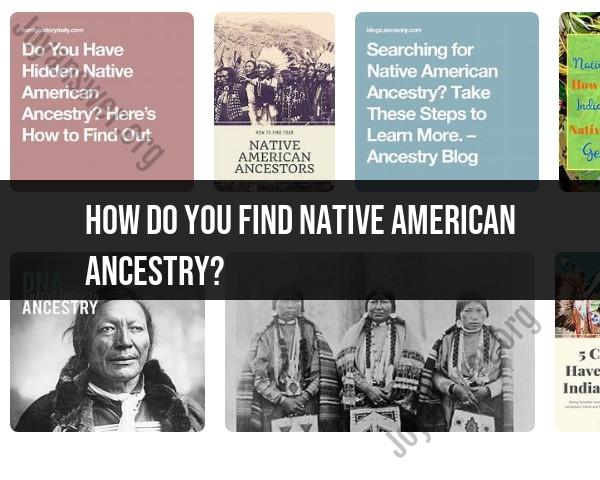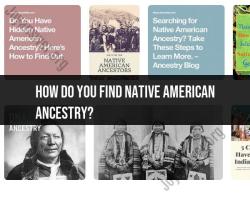How do you find Native American ancestry?
Finding Native American ancestry through genealogical research can be a complex and challenging process, but it is possible with the right approach and resources. Here are some steps to help you get started:
Start with What You Know:Begin your research by gathering as much information as possible about your own family, including names, birthplaces, and dates of birth, marriage, and death. Talk to living relatives who may have knowledge of Native American ancestry within the family.
Interview Relatives:Interview older family members to learn about any Native American heritage in your family. Document their stories and memories, as oral history can be a valuable source of information.
Gather Existing Family Records:Collect any existing family records, such as birth certificates, marriage certificates, death certificates, family Bibles, and photographs. These documents may provide clues to Native American heritage.
Research Online Databases:Utilize online genealogy databases, such as Ancestry.com, MyHeritage, and FamilySearch. These platforms have extensive collections of historical records, including census records, military records, and immigration records that may contain information about your ancestors.
Census Records:U.S. federal and state census records can be particularly helpful in tracing Native American ancestry. Look for notations of race or ethnicity that may indicate Native American heritage.
Vital Records:Birth, marriage, and death certificates often provide valuable information about family members and can help you trace your lineage.
Native American Rolls and Records:Search for Native American rolls, tribal enrollment records, and Indian census records. These documents can provide direct evidence of Native American ancestry.
Tribal and Community Resources:Reach out to the specific tribe or community you suspect your ancestors may have belonged to. Many tribes have genealogical resources and enrollment offices that can provide assistance and guidance.
DNA Testing:Consider taking a DNA test through services like 23andMe, AncestryDNA, or MyHeritage DNA. These tests can provide insights into your genetic heritage and may reveal Native American ancestry.
Local Archives and Libraries:Visit local archives, historical societies, and libraries in the areas where your ancestors lived. They may have valuable records and resources for genealogical research.
Collaborate with Genealogists:If you're struggling to make progress, consider hiring a professional genealogist who specializes in Native American genealogy. They can provide expertise and access to additional resources.
Join Genealogy Forums and Groups:Online genealogy forums and social media groups can be helpful for connecting with others who are also researching Native American ancestry. You can share information and learn from their experiences.
Keep in mind that tracing Native American ancestry can be challenging, as records may be incomplete or lost due to historical factors, and Native American identity is often based on tribal affiliations. It's important to be respectful and sensitive when researching your Native American heritage, as Native communities have distinct cultures, histories, and identities.
Tracing Native American Ancestry: A Journey of Discovery
Tracing Native American ancestry can be a challenging but rewarding journey. It can be difficult to find records due to the forced removal of Native peoples from their homelands and the destruction of their records by the US government. However, there are a number of resources available to help you trace your Native ancestry, including:
- Family records: Talk to your family members and see if they have any information about your Native heritage, such as family stories, photos, or documents.
- Tribal records: Many tribes have their own records that you can access. Contact the tribe(s) you believe you have ancestry from and see what records they have available.
- Government records: The US government has a number of records that can be helpful for tracing Native ancestry, such as census records, birth and death records, and military records.
- DNA tests: DNA tests can be used to identify Native American ancestry. However, it is important to note that DNA tests cannot determine tribal affiliation.
Genealogy and Research Tools for Native American Heritage
There are a number of genealogy and research tools that can be helpful for tracing Native American ancestry. Some of these resources include:
- National Archives and Records Administration (NARA): NARA has a number of records that can be helpful for tracing Native ancestry, including census records, birth and death records, and military records.
- Bureau of Indian Affairs (BIA): The BIA has a number of resources available for tracing Native ancestry, including a guide to tracing American Indian ancestry and a list of tribal enrollment requirements.
- FamilySearch: FamilySearch is a free online genealogy service that has a number of records that can be helpful for tracing Native ancestry.
- Ancestry.com: Ancestry.com is a paid online genealogy service that has a number of records that can be helpful for tracing Native ancestry, including tribal records.
DNA Testing and Ancestry Services for Indigenous Roots
There are a number of DNA testing and ancestry services that can be used to identify Native American ancestry. Some of these services include:
- 23andMe: 23andMe is a DNA testing and ancestry service that can be used to identify Native American ancestry.
- AncestryDNA: AncestryDNA is a DNA testing and ancestry service that can be used to identify Native American ancestry.
- MyHeritage DNA: MyHeritage DNA is a DNA testing and ancestry service that can be used to identify Native American ancestry.
It is important to note that DNA tests cannot determine tribal affiliation. Tribal affiliation is determined by the tribe(s) themselves.
Preserving and Celebrating Native American Ancestry
Once you have traced your Native American ancestry, you may want to consider ways to preserve and celebrate your heritage. There are a number of ways to do this, such as:
- Learning about Native culture and history: There are a number of resources available to help you learn about Native culture and history. You can read books and articles, watch documentaries, and visit Native cultural centers and museums.
- Connecting with other Native people: There are a number of ways to connect with other Native people, such as attending powwows, joining a Native organization, or volunteering on a reservation.
- Sharing your story: You can share your story of tracing your Native ancestry with others. This can help to educate others about Native history and culture.
Stories and Experiences of Those Exploring Their Native Roots
There are a number of stories and experiences of those exploring their Native roots. Here are a few examples:
- Heather Hansman: Heather Hansman is a writer and podcaster who traced her Native American ancestry in her book "Unclaimed Territory: My Journey to Reconnect with My Native American Heritage."
- Rebecca Nagle: Rebecca Nagle is a writer and journalist who traced her Native American ancestry in her book "Digging Up the Past: An Ancestor's Journey."
- Daniel Heath Justice: Daniel Heath Justice is a professor of English at the University of British Columbia who has written extensively about Native American ancestry and identity.
These are just a few examples of the many people who are exploring their Native roots. Tracing Native American ancestry can be a challenging but rewarding journey. It can help you to learn more about your family history and culture, and to connect with other Native people.



